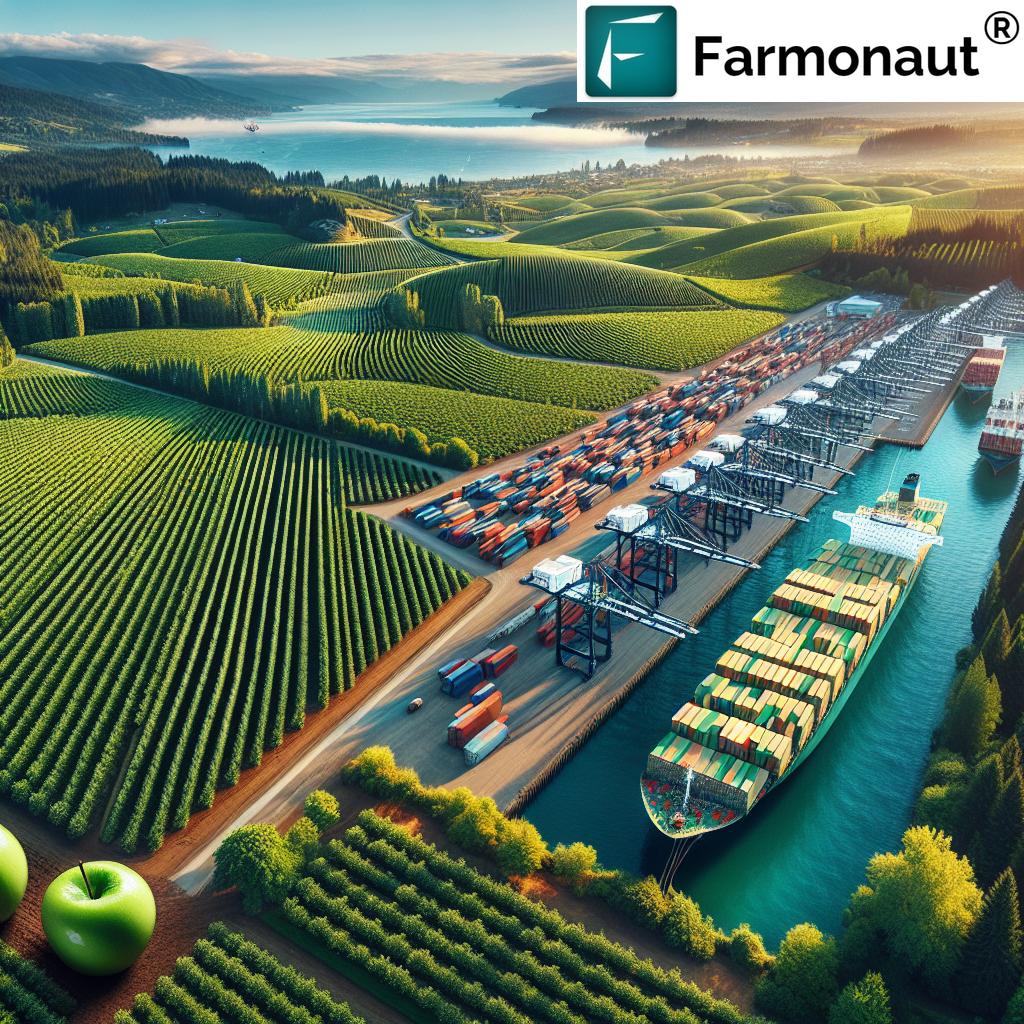Washington State Agriculture: How Tariffs Impact Apple Exports and Trade Jobs
“Washington state’s apple industry faces export challenges due to tariffs, potentially affecting over 40,000 trade-related jobs.”
In the heart of the Pacific Northwest, Washington state’s agricultural sector stands as a testament to the region’s fertile lands and hardworking farmers. However, recent years have seen this thriving industry face unprecedented challenges, particularly in the realm of international trade. As we delve into the intricate web of tariffs, export markets, and economic impacts, we uncover a story that resonates far beyond the orchards of the Evergreen State.
The Apple of Washington’s Eye: A Sector Under Pressure
Washington state has long been synonymous with crisp, juicy apples that grace supermarket shelves across the globe. Yet, the very foundation of this industry is being shaken by the ripple effects of US trade tariffs. The impact on Washington state agriculture exports has been profound, touching not just the apple industry trade relations but also the livelihoods of thousands of workers in Washington state trade jobs.

The introduction of steel and aluminum tariffs by the previous administration set off a chain reaction that reverberated through various sectors of the economy. While the intent was to protect domestic industries, the consequences for agriculture, particularly for apple growers, were severe and far-reaching.
The Domino Effect: From Steel to Apples
The connection between steel and aluminum tariffs effects and the apple industry might not be immediately apparent, but it’s a textbook example of the interconnectedness of global trade. When the United States imposed tariffs on steel and aluminum imports, trading partners responded with retaliatory measures. India, once the second-largest market for American apples, implemented a 20% tariff on U.S. apple imports, effectively slamming the door on a $120 million market for Washington growers.
This retaliation wasn’t limited to India. Other key agriculture export markets also imposed similar barriers, creating a perfect storm for Washington’s apple industry. The result? A dramatic decline in exports, with shipments to India plummeting from $120 million in 2017 to less than $1 million by 2023.
The Human Cost: Jobs and Communities at Risk
Behind the numbers and trade policies are real people and communities. Washington state’s economy is deeply intertwined with international trade, with two out of every five jobs tied to trade-related industries. The tariff disputes have put these jobs at risk, affecting not just farm workers but also those in transportation, packaging, and various support industries.
- Over 1,400 apple growers in Washington state
- Approximately 68,000 workers supported by the apple industry
- Potential job losses in related sectors such as transportation and packaging
The impact extends beyond immediate job losses. There’s a ripple effect on local economies, with reduced spending power affecting businesses across the state. Moreover, the uncertainty created by trade disputes makes it challenging for farmers to plan for the future, potentially leading to long-term structural changes in the agricultural landscape.
Navigating Troubled Waters: The Role of Ocean Shipping Reform
“Recent ocean shipping reforms aim to address rising international shipping costs, which have increased by up to 300% since 2020.”
As if the tariff challenges weren’t enough, Washington’s agricultural exporters have also been grappling with skyrocketing international shipping costs. The global supply chain disruptions that followed the COVID-19 pandemic led to unprecedented increases in shipping rates, further squeezing the margins of apple exporters.
In response to these challenges, recent ocean shipping reform efforts have aimed to provide some relief. The Ocean Shipping Reform Act, spearheaded by Senator Maria Cantwell, seeks to address these issues by:
- Cracking down on unreasonable shipping practices
- Improving transparency in the shipping industry
- Strengthening the authority of the Federal Maritime Commission to protect American exporters
These reforms are critical for Washington’s agricultural sector, as they aim to ease the burden of transportation costs and improve access to global markets. For apple growers, every reduction in shipping costs translates to improved competitiveness in international markets.
Strategies for Resilience: Adapting to a Changing Trade Landscape
In the face of these challenges, Washington’s agricultural sector is not standing still. Farmers, industry leaders, and policymakers are actively pursuing strategies to navigate the complex trade environment and secure the future of the state’s agricultural exports.
Diversification of Export Markets
One key strategy is the diversification of export market strategies. While traditional markets like India have become more challenging due to tariffs, efforts are underway to explore and develop new markets for Washington apples. This includes:
- Expanding presence in Southeast Asian markets
- Exploring opportunities in emerging economies
- Strengthening ties with existing trade partners less affected by tariff disputes
Innovation in Production and Marketing
Washington’s apple industry is also focusing on innovation to maintain its competitive edge. This includes:
- Developing new apple varieties that cater to international tastes
- Implementing advanced farming techniques to improve yield and quality
- Leveraging technology for better crop management and forecasting
In this context, technologies like those offered by Farmonaut can play a crucial role. Farmonaut’s satellite-based farm management solutions provide valuable insights for crop health monitoring and resource management, helping farmers optimize their operations in these challenging times.
Advocacy for Supportive Trade Policies
Continued advocacy for supportive trade policies remains crucial. This includes:
- Pushing for the removal of retaliatory tariffs on U.S. agricultural products
- Advocating for farm bill support that addresses the needs of export-oriented farmers
- Promoting bilateral and multilateral trade agreements that benefit U.S. agriculture
The Road Ahead: Challenges and Opportunities
As Washington’s agricultural sector navigates these turbulent waters, several key factors will shape its future:
Global Economic Dynamics
The ongoing shifts in global economic power and trade relationships will continue to influence agriculture export markets. Washington’s farmers and exporters must remain agile, ready to adapt to new market realities and emerging opportunities.
Technological Advancements
The role of technology in agriculture is becoming increasingly critical. From precision farming techniques to blockchain-based supply chain management, technological innovations offer new ways to improve efficiency and competitiveness.
Climate Change and Sustainability
The agricultural sector must also contend with the challenges posed by climate change. Adapting to changing weather patterns and implementing sustainable farming practices will be crucial for long-term resilience.
Conclusion: A Call for Collaborative Action
The challenges facing Washington state’s agricultural exports, particularly in the apple industry, are multifaceted and complex. From the direct impacts of tariffs to the ripple effects on trade jobs and local economies, the stakes are high for the state’s farming communities.
However, with challenge comes opportunity. The resilience and innovativeness of Washington’s farmers, coupled with supportive policies and technological advancements, can pave the way for a robust and adaptable agricultural sector.
As we move forward, it’s clear that addressing these challenges requires a collaborative approach. Policymakers, industry leaders, and farmers must work together to:
- Advocate for fair and open trade policies
- Invest in infrastructure and technology to support agricultural exports
- Develop strategies to diversify markets and reduce vulnerability to trade disputes
- Support farmers in adopting sustainable and efficient farming practices
By taking these steps, Washington can not only preserve its status as a leading agricultural exporter but also set a model for resilience and adaptation in the face of global trade challenges.

The Role of Technology in Strengthening Agriculture
As we navigate these challenging times, the role of technology in agriculture becomes increasingly crucial. Innovative solutions like those offered by Farmonaut are playing a pivotal role in helping farmers adapt and thrive.
Farmonaut’s satellite-based farm management solutions provide farmers with real-time insights into crop health, soil moisture levels, and other critical metrics. This data-driven approach enables farmers to make informed decisions about irrigation, fertilizer usage, and pest management, ultimately optimizing crop yields and reducing resource wastage.
For Washington’s apple growers, such technologies can be particularly beneficial in:
- Improving orchard management practices
- Enhancing the quality and consistency of apple production
- Reducing operational costs through efficient resource utilization
- Providing data-backed evidence for sustainable farming practices, which can be valuable in international markets
Furthermore, Farmonaut’s blockchain-based traceability solutions can help address some of the challenges in international trade by ensuring transparency and authenticity in the supply chain. This can be particularly valuable in building trust with international buyers and potentially easing some of the non-tariff barriers to trade.
FAQs
- How have tariffs specifically impacted Washington’s apple exports?
Tariffs, particularly the 20% retaliatory tariff imposed by India, have drastically reduced apple exports from Washington. Exports to India fell from $120 million in 2017 to less than $1 million by 2023. - What strategies are Washington farmers using to overcome trade barriers?
Farmers are diversifying export markets, innovating in production and marketing, and advocating for supportive trade policies. They’re also leveraging technology for better crop management and exploring new market opportunities. - How does the Ocean Shipping Reform Act benefit Washington’s agricultural exporters?
The Act aims to crack down on unreasonable shipping practices, improve transparency, and strengthen protections for American exporters, potentially reducing shipping costs and improving access to global markets. - What role does technology play in helping Washington’s agriculture sector adapt to trade challenges?
Technologies like Farmonaut’s satellite-based farm management solutions provide valuable insights for crop health monitoring and resource management, helping farmers optimize operations and remain competitive in challenging market conditions. - How many jobs in Washington state are tied to trade?
Two out of every five jobs in Washington state are tied to trade and trade-related industries, underscoring the significant impact of trade policies on the state’s economy.
Earn With Farmonaut: Join Our Affiliate Program
Earn 20% recurring commission with Farmonaut’s affiliate program by sharing your promo code and helping farmers save 10%. Onboard 10 Elite farmers monthly to earn a minimum of $148,000 annually—start now and grow your income!
Learn More About Our Affiliate Program
Farmonaut Subscriptions
| Year | Tariff Rate (%) | Apple Export Volume (estimated tons) | Export Value (estimated USD) | Number of Trade Jobs Affected (estimated) |
|---|---|---|---|---|
| 2017 | 0 | 500,000 | 120,000,000 | 0 |
| 2018 | 20 | 400,000 | 96,000,000 | 5,000 |
| 2019 | 20 | 300,000 | 72,000,000 | 10,000 |
| 2020 | 20 | 200,000 | 48,000,000 | 15,000 |
| 2021 | 20 | 100,000 | 24,000,000 | 20,000 |
As we conclude this comprehensive analysis of Washington state’s agricultural challenges, it’s clear that the road ahead requires innovation, collaboration, and resilience. By leveraging cutting-edge technologies, advocating for fair trade policies, and adapting to changing market dynamics, Washington’s farmers can navigate these turbulent waters and emerge stronger. The future of Washington’s apple industry, and indeed its entire agricultural sector, depends on our collective ability to turn these challenges into opportunities for growth and sustainability.













